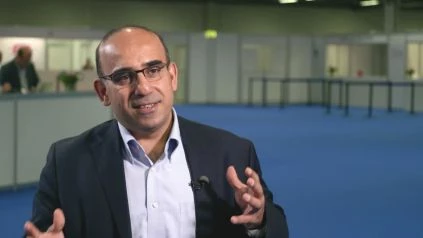Measurable residual disease (MRD) has become a crucial part of treatment planning and prognosis construction in many hematological diseases; however, in acute myeloid leukemia (AML), heterogeneity of disease has meant MRD has been difficult to quantify. Here, Mohamad Mohty, MD, PhD, of Saint-Antoine Hospital, Paris, France, discusses recent progress in AML MRD research at the 23rd Congress of the European Hematological Association (EHA) 2018 in Stockholm, Sweden. He speaks about data showing the importance of MRD as a prognostic indicator in first complete remission, as well as studies showing the huge influence of MRD status on stem cell transplant outcome. He explains how this knowledge can be used to inform future treatment, with MRD positive transplant patients being given aggressive targeted therapy soon after transplant.
MRD in AML: prognoses, transplant and treatment planning

